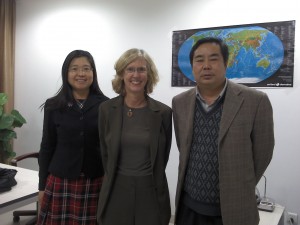December 14, 2011 at 9:08 pm
· Filed under Archives, Conferences, Intellectual Property, Legal News
2011年12月14日下午2时至5时,由北京师范大学互联网政策与法律研究中心(IIPL)主办的“专利复审、无效制度”学术沙龙在教七204成功举行。本次学术活动由北京师范大学法学院互联网政策与法律研究中心主任薛虹教授主持,参加本次学术活动的嘉宾有:中国人民大学知识产权学院副院长郭禾教授、国家知识产权局专利复审委员会刘磊审查员。本次学术沙龙有来自于法学院的六十余名同学参加。
薛虹教授首先致欢迎辞,对出席本次学术沙龙的到场嘉宾和同学表示热烈欢迎。在学术沙龙主题环节之前,薛虹教授简要介绍了举办本次学术活动的相关背景,并谈及美国专利法的最新修改以及与此相关的专利复审、无效制度相关问题,并希望大家通过本次学术沙龙能够对“专利复审、无效制度”有一个更加全面和深入的认识。
沙龙的第一个环节是专利复审委员会无效宣告请求案件的模拟口头审理,这一环节由刘磊审查员主持。模拟口头审理的合议组成员(3人)及书记员(1人)、无效宣告请求人及其代理人(4人)、专利权人及其代理人(4人)均由参加本次沙龙的同学担任。为了保证模拟口审的效果,本次活动之前已向同学们分发了相关案例材料以便预习。模拟口审中同学们准备充分,对案情理解透彻,法律程序操作规范,法律语言运用恰当,并对案件中所涉及的相关内容展开了激烈的辩论。通过模拟口审,不仅深化了同学们对专利无效宣告程序以及无效宣告请求法律条文的认识,而且提高了同学的辩论水平和表达能力。
沙龙的第二个环节是由郭禾教授所作的专题讲座。郭禾教授曾经多次赴欧洲研修欧盟法以及欧洲知识产权法,对于欧美专利复审、无效制度有着深入的研究。他首先深入浅出地介绍了复审程序的历史发展过程,随后又从法理学角度对复审程序的启动、复审审查过程以及复审的法律后果作了分析和讲解,最后针对美国专利法的最新修改内容,分别谈及“多方评审(review)程序”、“授权后评审(review)程序”及其对我国专利制度构建的意义。主题发言结束后,在场同学积极与各位老师交流,期间更有精彩讨论,各位老师深厚的理论知识和独到的见解让在场同学获益良多,全场掌声不断。
通过本次学术沙龙,使得同学们在三个方面获得提高:一是在理论学习层面上,使同学们有机会更全面、更深刻的了解专利法中关于专利复审、无效的相关知识;二是在实务学习层面上,生动再现了专利复审、无效案件中的审查内容和准司法审查程序;三是在能力提升方面,为同学们提供了一次思辩能力的良好锻炼机会,为培养法学思辩能力奠定基础。
Permalink
December 8, 2011 at 9:24 pm
· Filed under Archives, Conferences, IDNs

ICANN’s CEO and a group of top experts in China spoke at a Beijing event on December 8, 2011 aimed at informing, educating and engaging China’s business and Internet communities, as part of ICANN’s global gTLD communication program.
Beckstrom praised China’s role in helping to build a strong global Internet and for helping to make Internationalized Domain Names (IDNs) a reality in China, for the benefit of its 1.3 billion people. IDNs facilitate the use of non-Latin characters, like Chinese, in Internet domain names.
Prof. Xue summarized the Chinese Internet community’s contribution to DNS and particularly to IDN technology and policy development. She emphasized the important of global outreach observing the principles of multilingualism and culture diversity.
Permalink
November 11, 2011 at 8:59 pm
· Filed under Archives, Conferences, Intellectual Property, Legal News

2011年11月11日,应IIPL的邀请,美国乔治华盛顿大学全球和国际问题研究所主任谢苏珊(Susan K.Sell)教授来到我院为本科生作“知识产权与社会发展”的学术讲座。本次活动是为了进一步扩大IIPL及BNU的国际交流与合作,同时也是为了响应我校双语教学工作的开展而进行的又一次尝试。活动期间,苏珊教授受到了法学院党委书记张远煌教授的亲切会见。
谢苏珊教授早年在加利福尼亚大学伯克利校区获得博士学位,研究领域主要涉及国际政治关系、南北关系等,且对于知识产权领域的国际政策、公共政策问题曾发表众多学术成果。此次交流活动主要分为两项内容。一项内容为英文学术讲座,苏珊教授从国际视角出发深入浅出地介绍了知识产权的政策性问题,讲座内容涉及作为公共政策的知识产权、知识产权相对于物权的特点、美国知识产权政策的经验以及国际政治经济中的知识产权等。我院的硕士生和博士生也参加了讲座。我院同学就知识产权的相关问题用英文积极提问,并得到了苏珊教授的耐心解答。活动的另一项内容为学术交流,薛虹教授与苏珊教授分别就当前知识产权领域的国际相关问题以及教学问题交换了意见。活动期间,苏珊教授表达了与我院共同进一步深化合作形式、拓展合作平台的意愿。
通过本次活动,一方面,增进了我院与国外学术界的联系,提高了我院的国际影响力;另一方面使同学们在知识产权领域的学习中开阔了国际视野,并激发了进一步提高外语水平,从而更好的掌握英语这一国际交流工具的热情。
Permalink
October 26, 2011 at 11:19 pm
· Filed under Archives, Conferences, Intellectual Property, Legal News
 ICANN 42th public meeting is going on from Sunday October 23, 2011 to Friday October 28, 2011 in Dakar, Senegal. The trademark clearinghouse is going to take off despite many doubts and concerns.
ICANN 42th public meeting is going on from Sunday October 23, 2011 to Friday October 28, 2011 in Dakar, Senegal. The trademark clearinghouse is going to take off despite many doubts and concerns.
The current plan has many flaws, particularly in the following aspects:
1. The trademark database that consists of the trademark registration information submitted from around the world is going to be confidential. This will definitely be detrimental to the people’s right to access public information and transparency and accountability of the services. All trademark registration information is publicly available. Why the database that put up the public information becomes confidential or restrictive accessible to pertinent registries or registrars, rather than public at large? The argument on database right or copyright of the database is not legally sound. Even if there could be such right generated under certain countries’ laws, it should not be used to claim against public access to the information included. The closure of the database is by all means a counteract to the global A2K movement.
2. The clearing house was designed primarily to protect the trademark in Latin scripts. It is poor design lack of diversity consideration. This is cultural arrogance showing the dominance of developed world at ICANN. Character variant issues are coming back to bite the process.
trademark clearinghouse and claim services would need to refer to the variant table for purpose of prevent cyber-squatting (variant squatting) against the Chinese-character trademarks. Otherwise, the service providers (without knowledge of Chinese language) would deem the domain names in simplified characters not visually similar to the trademark in traditional characters, vice verse.
“Variants” have never been an issue for China Trademark Office or Law Enforcement Agency when a trademark is applied for registration and/or seeking for legal protection. Any Chinese speakers know that simplified and traditional version of one character are equivalent. They don’t need the aid of the variant table. Someone who obviously knows neither Chinese language nor law attempted to argue that owner of a word mark in simplified form is entitle to claim the tradition form merely because the latter is “semantically” or “meaningfully” similar to the former. This is nonsense by all means. We should not mix the legal issue with the language variants issues. Character reform and evolution are the public knowledge of Chinese speakers, just like the upper case and lower case of Latin scripts. Is there any need for Latin script countries to enact a law to stipulate the trademark protection is not case sensitive? So, Chinese trademark protection is NOT variant sensitive!
The issue is only for the Trademark Database and/or authentication & validation service providers who does not know Chinese and mechanically compare the virtual similarity of a word mark and a Domain Name string.
Although variants are “considered” in trademark examination or enforcement, they are not shown in trademark registration
certifications. If a word mark is applied for registration and approved by the trademark office, the certificate will merely show the
word (in either simplified or traditional characters) as it is, rather than listing all its variants. Then how to include the variants in TCH
database and how to verify those “non-registered” variants? Question is still there.
Permalink
October 10, 2011 at 6:10 pm
· Filed under Archives, Conferences, Internet Governance, Legal News
The Asia Pacific Trade Facilitation Forum 2011, under the theme of “Trade Facilitation beyond Borders: International Supply Chain Efficiency,” focusing on how trade facilitation can enhance supply chain efficiency, was held on October 3-8, 2011 in Seoul. Critical trade facilitation issues affecting the efficiency of regional and international supply chains were discussed. There were two events related to UNNeXT Legal Panel, which is primarily tasked to research the feasibility of a Regional Agreement on Electronic Exchange of Trade Data and Documents and provide the pertinent training materials and services for the stakeholders in the Region.
On October 6, 2011, The United Nations Network of Experts for Paperless Trade in Asia and the Pacific (UNNExT) had a side meeting at the Forum in the afternoon. The leads of each working group on legal issues, data harmonization, trade process and single window implementation gave a briefing on their works done so far. Prof. Xue presented on behalf of the legal panel and reported the outcome of Legal Panel Bangkok Meeting in July. The suggestions on the regional agreement attracted many comments from the audience.
On October 7-8, 2011, UNNExT Capacity Building Workshop on Addressing Legal Issues for Single Window Implementation and Paperless Trade was held at Seoul COEX Complex. The pilot workshop introduced participants to legal issues that need to be addressed to enable paperless trade and single window implementation at the national level, as well as to facilitate interoperability and interconnectivity of e-trade systems across borders. It built the capacity of participants to develop comprehensive and harmonized paperless trade legal frameworks, providing a sound legal basis for the operation and interoperability of national single windows and related e-business and e-logistics platforms. More than 20 countries’ delegations joined the workshop. Prof. Xue who reviewed the training materials prepared and presented by Prof. Rolf Weber, gave a presentation on the Legal Environment of Paperless Trade in China. The audience was particularly interested in the progress China made to legally enable and facilitate the electronic transaction, particularly on Internet Retails. Prof. Xue’s talk had got most questions of the workshop. These questions are on the electronic signatures and transactional data that are newly subject to national regulations.
Permalink


